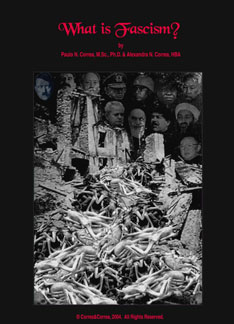![Akronos logo]](/images/akronos_wheel.jpg)
|
Akronos Publishing Concord, ON, Canada www.aetherometry.com |
![Akronos logo]](/images/akronos_wheel.jpg)
|
Akronos Publishing Concord, ON, Canada www.aetherometry.com |

What Is Fascism: Is There Any Fascism Left?
by Correa, Paulo N. & Correa, Alexandra N.
Published in February 2004. 65 pages.
Philosophy of Science & the Politics of Thought
Monograph AS1-06
|
ABSTRACT
Our epoch prides itself on having defeated fascism, on being an epoch which is no longer fascist. In fact, it is impossible these days to claim to be a fascist without appearing quaint - and no serious mass-movement overtly invokes fascism as its ideology or as its politics. Fascism either is no more, or it has reached a point of complete dissimulation. Which is it? To determine this, one is obliged to examine anew the nature of fascism, beyond the artificial and arbitrary delimitations that appear to dissolve its meaning and erase its reality, past and present. When one hears that there can be no 'authentic fascism before democracy' or unless it arises within a democracy, from a democracy; or that fascism is nationalistic and not a transnational movement; or that it is synonymous with totalitarianism, or with the dictatorship of a party-police machine; or that it is a secular movement and not a religious one, etc, etc - one knows that those who fashion these glib reductions are effectively producing a loss of descriptive power of the term 'fascism' by practicing the obfuscation of its difference. Thus fascism has acquired a modern invisibility that is intent on precluding any connection of its pathology to power, terrorism, leftism, revolution, war, and all the present epochal forms of collective suicide. This state of affairs betrays still deeper psychosocial constraints operating at unconscious levels of modern human activity. Indeed, present-day forms of social organization have incorporated so many of the control and conditioning methods, rules, techniques and dispositives of fascism, and insinuated them so deeply into everyday life, that no one recognizes fascism any longer, nor its distinguishing traits, for what they are. Hence, the term has lost its descriptive and analytical power, its real senses and utility, to the benefit of the dissemination of fascism throughout civil society - a sociological phenomenon which a circumscribed meaning of the term is no longer able to encompass. Yet, to avoid repeating the grave mistakes of epochs past, to further the analysis of socio-historical processes or invent better potentialities for the living and its understanding, appears today, more than ever, to be conditional upon a real grasp of what fascism actually is, and what constitutes its defining difference. This is the challenge the present monograph takes up - from an entirely novel and provocative perspective. |